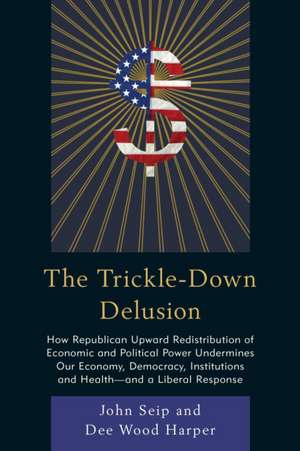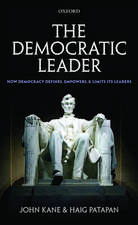The Trickle-Down Delusion
Autor John Seip, Dee Wood Harperen Limba Engleză Paperback – 2 mai 2016
Preț: 474.85 lei
Nou
Puncte Express: 712
Preț estimativ în valută:
90.86€ • 99.01$ • 76.56£
90.86€ • 99.01$ • 76.56£
Carte tipărită la comandă
Livrare economică 24 aprilie-08 mai
Preluare comenzi: 021 569.72.76
Specificații
ISBN-13: 9780761866978
ISBN-10: 0761866973
Pagini: 464
Dimensiuni: 152 x 229 x 35 mm
Greutate: 0.64 kg
Editura: Rowman & Littlefield
ISBN-10: 0761866973
Pagini: 464
Dimensiuni: 152 x 229 x 35 mm
Greutate: 0.64 kg
Editura: Rowman & Littlefield
Notă biografică
John Seip is a lawyer and oil and gas landman and regulatory practitioner whose career has been spent entirely in a corporate setting, including having spent several years working with corporate lobbyists, congressional staffers, trade groups and agencies in Washington, DC on energy projects. He worked as a Republican volunteer in the presidential campaign of Ronald Reagan in 1980, supported Libertarian Party candidate Ron Paul in the presidential campaign of 1988, and worked as a Democratic volunteer in the presidential campaigns of Barack Obama in 2008 and 2012. He has a B.A. in Sociology from Louisiana State University and a J.D. from the Paul M. Hebert Law Center, Louisiana State University.
Dee Wood Harper, Jr. is Professor Emeritus of Sociology and Criminology at Loyola University New Orleans. His research has appeared in the American Journal of Sociology, Sociological Spectrum, Annals of Tourism Research, International Journal of Law and Information Technology, Artificial Intelligence and Applications, Criminal Justice Review, Homicide Studies, Deviant Behavior, American Journal of Economics and Sociology, Computational Statistics and Data Analysis, and American Behavioral Scientist. He is also the co-editor and co-author of several books including Violence: Do We Know It When We See It? and Why Violence: Leading Questions Regarding the Conceptualization and Reality of Violence in Society, Crime and Criminal Justice in Disaster, 3rd edition (2015), the foremost book on this topic, Fundamentals of Criminology: New Dimensions, 2nd edition (2015), Preventing Lethal Violence in New Orleans, a Great American City, 2015 and Toward a Criminology of Disaster under contract and coming in 2016. He earned a B.A. from George Peabody College of Vanderbilt University and his M.A. and Ph.D. from Louisiana State University. He is also a life-long Democrat whose father, upon graduating from the University of Georgia in 1934 in the midst of the Great Depression, went to work with the Civilian Conservation Corp, cutting firebreaks in the south Georgia piney woods.
Cuprins
Preface: A Call to Action
Acknowledgements
Introduction: Triumph of the Delusion That to Help the Middle Class and Poor Policies
Must Help the Rich
Rebirth of the Delusion that to Help the Middle Class and Poor Policies Must Help the Rich
Ideology and Terminology
The Metric and the Argument
PART I: THE DELUSIONAL TRICKLE-DOWN CONSERVATIVE REPUBLICAN VIRTUAL REALITY BUBBLE AND LIBERAL REFUSAL TO CONFRONT IT
Chapter 1: The Delusional Trickle-Down Conservative Republican Virtual Reality Bubble and the 2012, 2014 and 2016 Elections and Beyond
The Romney-Ryan Campaign: ¿We Built It¿ On Deception
Conservatism¿s Moral Universe of ¿Makers¿ versus ¿Takers¿
Chapter 2: Democrats Must Elaborate on and Sustain an Anti-Trickle-Down Narrative to Defeat Republicans
Barack Obama versus Trickle-Down
The Liberal Preference to Psychoanalyze
The Liberal Inability to Communicate with Middle America
PART II: THE TRICKLE-DOWN DELUSIONS
Chapter 3: Trickle-Down: Enabling Realization of the Dream to Make the ¿Holy Rollers Lie Down with the High Rollers¿
The Shared Authoritarian Hierarchical Vision of Trickle-Down Conservatism¿s Elements
Conservatism¿s Melding of Godliness and Selfishness
Trickle-Down Conservatism Mirrors Sixties Liberalism
Chapter 4: Trickle-Down Conservatism versus the Facts
Facts Confronting the Delusions Supporting the Trickle-Down Delusion
How the Facts of Trickle-Down¿s Failure Were Hidden in Economic Theory
Chapter 5: Trickle-Down Conservatism versus the Classical Liberalism It Claims for Inspiration
Liberal Democracy¿s Trickle-Up Vision versus the Illiberal Vision of Trickle-Down
How Trickle-Down Conservatism Undermines Liberal Democracy
The Parallel Evolutions (for the Worse) of Hayek and Conservatism
Chapter 6: Trickle-Down Conservatism versus Public Opinion
The View from Inside the Bubble: Stay the Trickle-Down Course
A Call for a Conservatism That Is Fact Based, Not Faith Based
Chapter 7: A Narrative of Trickle-Down Failure: The Productivity/Wage Disconnect
The Productivity/Wage Disconnect
Failure to Share the Revenues from Productivity Growth Yields Massive Growth in Inequality
Why Revenues from Productivity Growth Are Not Shared: We Demand They Not Be
Models Illustrating the Effects of Trickle-Down
Austerity Causes Slow Growth, Which Increases Deficits
A Summary Narrative of Trickle-Down Failure
Chapter 8: Trickle-Down¿s Rule of Law: Power to the Propertied and Powerful
Introduction to the Rule of Law
The Privilege Accompanying Property Ownership
Institutionalization of the Political Process as a ¿Free Market¿¿Rigged in Favor of the Propertied
The Bush v. Gore ¿Second Bite¿ Doctrine Enunciating Equal Protection Weighted in Favor of the Propertied
How ¿Freedom¿ Becomes an Anti-Democratic Bludgeon Wielded on Behalf of the Propertied
Extending the Rule of the Propertied and Powerful by Other Means
The Rule of Law in the ¿War on Terror¿
PART III: TRICKLE-UP: THE WAY THE WORLD REALLY WORKS
Chapter 9: The Information Revolution, Globalization and Trickle-Down
Versus the Poor and Middle Class
The Importance of a Job to Social Status and Self-Esteem
The Negative Effects of the Information Revolution and Globalization Compounded by Trickle-Down
Why the Conservative Culture of Poverty Theory Fails
Chapter 10: How Liberal Institutions Work for the Poor and Middle
Class
The Constancy of Connectedness¿and Conflict
How Institutions Help Us Prevent Self-Interest from Destroying Humanity
Institutions as Mediating Structures and How Conservatism Undermines Them
Illiberal Democracy and Totalitarianism
¿Coercive Democracy¿ or the ¿Shock Doctrine¿: Trickle-Down¿s Ignorance of the Importance of Institutions Applied Abroad with Missionary Zeal
Maximizing Institutional Functioning
Chapter 11: The Liberal Value of Equality¿and Why Government Policies MustSupport a Strong Middle Class
Inequality Undermines Our Economy, Democracy, Institutions and Health
Inequality Undermines Economic Growth and Social Mobility and Economic and Socio-Political Stability
Equality Is a Matter of Life and Death Because Inequality Impairs Health and Shortens Life Spans
The Necessity of a Strong Middle Class¿in Theory and Evidence
Conclusion: Inequality Causes Inequality and Other Problems, Requiring Government Solutions
Chapter 12: The Liberal Values of Checks and Balances, Knowledge, Tolerance, Peace and the Rule of Law
The System of Societal Checks and Balances
Respect for Knowledge
Tolerance
Peace and Nonviolent Resistance
Rule of Law
Conclusion: Liberal Values are Necessary Complements to Capitalism and Democracy
Chapter 13: Trickle-Up: A Bottom-Up, Post-Bubble Growth Model Based on Growing the Middle Class
Preliminary Thoughts on Liberalism and Trickle-Up
Trickle-Up Theory from Smith, Tocqueville and Others
A Trickle-Up Narrative
Chapter 14: Liberal Reclaiming of the American Dream
Domestic Policy Recommendations
¿If You Want to Live Like a Republican, You Have to Vote Democrat¿
Index
Descriere
Trickle-down values have distorted not only our economic thought but also our political thought, our sociology and our concept of the rule of law. The trickle-down policies promoted by the Republican Party are undermining our economy, democracy, institutions and health. We, the American people, must return to liberalism that works.














